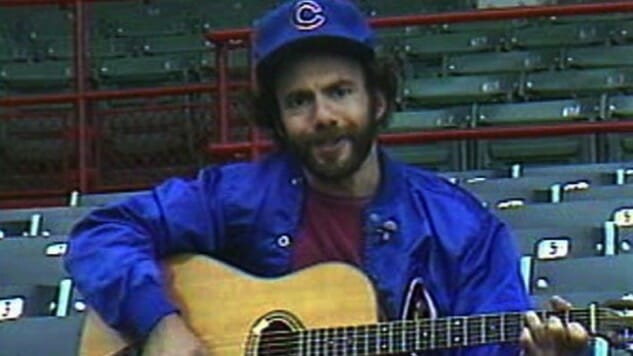“Do They Still Play the Blues in Chicago?”: Will This World Series Victory Change the Music of the Cubs?

As any fan can tell you, baseball has its own music: the thwap of the ball hitting leather, the indistinct guttural noise we’ve all come to accept translates to a called strike three, the way that crack of the bat—one of the most beautiful, satisfying sounds in the world—sounds different when a ball’s headed out of the park and you can hear it’s a home run before you see it.
But beyond the music of baseball, there’s the music about baseball, perhaps moreso than any other sport. No other sport so accurately reflects life itself—no time limit, endless possibility, full of moments both spectacular and mundane—and as such, it consistently inspires great art. There’s a reason the most famous poem about baseball features the mighty Casey choking in the clutch and leaving Mudville joyless.
It’s the same reason so many of those songs are about the Chicago Cubs.
We can sit here and talk forever about curses and goats and 1908 and how prior to this year, the last time the Cubs won the pennant, Hitler had only been dead for a few months—but unless you’re a Cubs fan, you can’t really know what it’s like. The best way I can describe it is it’s like you’re Prometheus, chained to a rock for eternity, doomed to have your liver pecked out by an eagle every morning only to regenerate in time for tomorrow’s pecking, except instead of getting desensitized to it or resigned to your fate, you go to bed every night thinking, “Wait till tomorrow. Tomorrow’s the day that eagle stops coming to peck out my liver. I just know it.”
But that eagle keeps coming, and each time it does, you’re heartbroken. You’re not surprised—you’re not a fool—but you’re upset because deep in your gut, which is now being pecked apart by a bird of prey for the umpteenth time, you thought today would finally be the day that this monster stopped coming to shred your insides.
And then, one day, a bonafide miracle happens. Hercules shows up, kills the eagle and gets you off that miserable rock.
The Chicago Cubs overcome a 3-1 deficit to win their first World Series since 1908. In Game 7. In extra innings.
![]()
It’s easy to see why Cubs fandom gets romanticized in music; it’s got the same basic concept as thousands of love songs—you love someone or something deeply, they keep hurting you, but you can’t bring yourself to quit them.
Of course, there are cheerful Cubs songs too, fight songs like Hey Hey, Holy Mackerel or the Beach Boys’ 1987 Here Come the Cubs which is little more than a reworked version of “Barbara Ann” (featuring new lyrics like “Cubs Cubs Cubs, here come the Cubs” and “wind’s blowing out, wind’s blowing in, whichever way it’s blowing, the Cubs are gonna win”). And even if you’re not a Cubs fan, you’ve surely heard Steve Goodman’s “Go Cubs Go” more than a handful of times this postseason, but it hasn’t always been the Cubs’ victory song.
It started as the theme for the Cubs’ radio broadcasts (hence the “you can catch it all on WGN” line, which, incidentally, is no longer totally accurate), and the tradition of playing it at Wrigley Field after every Cubs win is a fairly recent one, dating back to 2007. The Cubs won their division that year, and “Go Cubs Go” became a fixture, the team’s official victory song, a new ritual for a fanbase that lives and dies by rituals. You don’t mess with a winning formula.
-

-

-

-

-

-

-

-

-

-

-

-

-

-

-

-

-

-

-

-

-

-

-

-

-

-

-

-

-

-

-

-

-

-

-

-

-

-

-

-








































